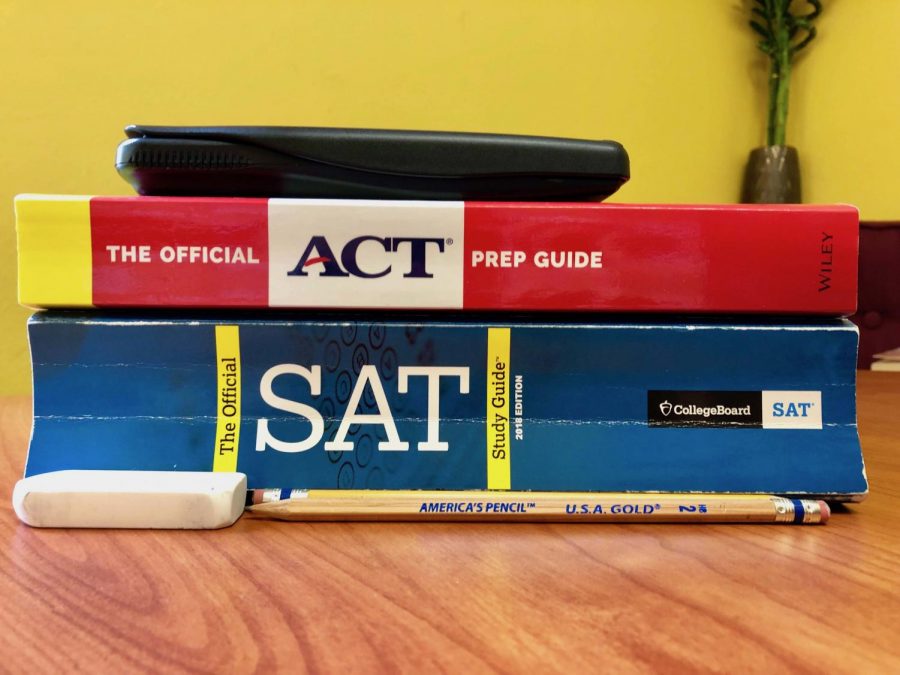SAT and ACT don’t have to be nerve-wracking; use these tips
Throughout the year, there are plenty of opportunities for students to sign up and take standardized tests such as the SAT and the ACT. Students often wonder why these tests are so important or how they can prepare properly for them. There are many ways to study such as tutoring, practice tests, or using an online tutor program such as Khan Academy.
There are different skills that can help students be successful when faced with these types of standardized tests. These tests are meant to demonstrate an understanding of one’s overall knowledge in language arts and math, and a higher score typically shows off higher levels of college readiness, which helps when a student sends out college applications.
The SAT, which was first used in the 1940s, is not currently an acronym for anything, but in its early years, the SAT was known as the Scholastic Aptitude Test. The SAT is a standardized test provided through College Board, which some students may know from taking Advanced Placement (AP) classes and exams. The tested subjects on the SAT include language and writing, reading, math (with SAT approved calculator permitted), and math without the use of a calculator, and an optional essay test.
The ACT, which was first used in 1959, is a bit different from the SAT. The ACT stands for American College Testing and is made up of four sections: English, mathematics, reading, and science, and an optional essay test. The ACT is administered through the ACT Organization and has a tighter time constraint compared to the SAT.
Many students around the nation think that studying for the SAT/ACT does not teach them anything besides how to master the ACT or SAT. Because of how difficult these tests can be to master, there are many different ways for students to study for the ACT and SAT.
“I mostly try to study the types of questions on the test so I’m familiar with the format,” said Olympic Heights’ junior Maxwell Eirich. Some students, such as Eirich, find it most beneficial to use practice tests to become more comfortable with the format and types of questions, while others find it more beneficial to go to tutoring and learn additional skills that will make them more successful.
Students can get a tutor to help them practice and brush up on all of the important skills that will be covered on the exams as well as take practice tests. It is also smart to begin preparing for these tests in advance so that not everything is crammed in right before the test. Also, Khan Academy offers a tutoring system where students can link their SAT scores to Khan Academy for free, personalized tutoring for subjects tested on the SAT.
Dr. D’Arcy Lyness, Behavioral Health Editor, and Child and Adolescent Psychologist, from Kidshealth.org, addresses some critical test-taking tips to improve one’s score. “First, be sure you’ve studied properly. It sounds like a no-brainer, but if you’re sure of the information, you’ll have less reason to be worried,” advises Lyness. “Get enough sleep the night before the test. Your memory recall will be much better if you’ve had enough rest. In a scientific study, people who got enough sleep before taking a math test did better than those who stayed up all night studying.”
Some more strategies include eating breakfast before the test in order to stay energized and to maintain focus during the test. Also helpful is making sure to only focus on one question at a time to not get distracted and not to let one hard question take up a lot of the time that can be used getting points elsewhere. This is a useful skill as these tests are scored in such a way that a student will not lose points for getting questions wrong, but will get points for each question that is correct.
Testtakingtips.com states, “Bring at least two pens/pencils with good erasers, a calculator with enough batteries, and any other resources that your instructor allows you to. Bring a watch to the test so that you can better pace yourself. Keep a positive attitude throughout the whole test and try to stay relaxed. If you start to feel nervous, take a few deep breaths to relax. Keep your eyes on your own paper, you don’t want to appear to be cheating and cause unnecessary trouble for yourself.”
As these tests are something everyone who plans to go to college will have to learn how to succeed at, it is important that students stay calm and focused. As long as students understand their strengths and weaknesses in each area, they can begin to prepare for their test. This will only make chances of success higher for the student.











